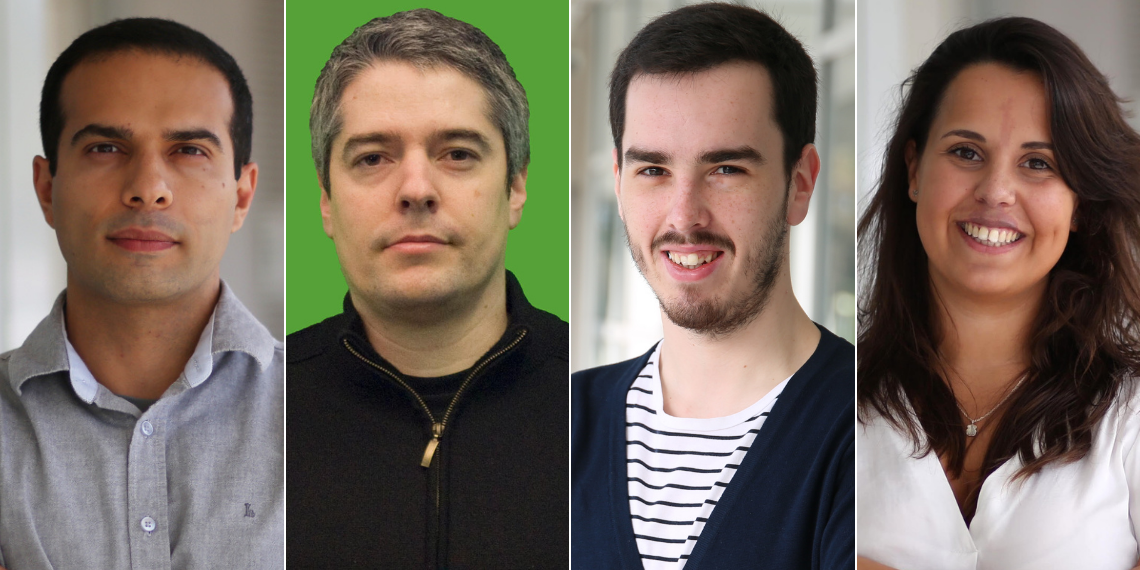George Santos, Ricardo Ferreira and João Aguiar (CPES)
“During October, the team consisting of George Santos, Ricardo Ferreira and João Aguiar concluded studies on the integration of solar farms and assessed the technical feasibility of implementing isolated systems using renewable energy for electrification purposes in Africa. They presented high-quality work with technical-scientific rigor considering a set of ambitious deadlines, facing a scenario where the data collection needed to characterise the systems was quite demanding”. *
– CPES coordinators
What challenges did the team face while carrying out the tasks?
We can break down the main challenges into three aspects: short delivery times; the proposed infrastructures were in the pre-project stage, i.e., the promoter had the possibility to change the equipment scheduled for installation in each project, according to the identified needs; some data from the studied network were not readily available.
How did you overcome them?
The permanent exchange of information between the infrastructures’ promoter, the transmission and local distribution companies, and INESC TEC, was crucial to obtain the necessary information for the study, to present proposals for small changes in the projects, and to meet the required deadlines.
What is the main differentiating factor of your work?
We can indicate the differentiating aspects of this project according to two outlooks: in technical terms, it focused on developing studies on the integration of variable renewable energy into the grid, while demonstrating its benefits, with a change in the project’s scope during the execution of the studies and a very short deadline to deliver results – also ensuring the technical quality of the deliverables; socially, it demonstrates the possibility of implementing the electrification of vast regions of the country through the use of renewable energy, thus contributing to the development of communities and areas.
How do you comment on this nomination?
We were quite pleased with this nomination. It’s a sign that we performed well, despite all the challenges during the studies, and that the centre’s coordinators acknowledge the quality of our work. However, and like many other projects at CPES, it is important to mention that this was a collective initiative and that the active participation of Bernardo Silva, as project coordinator, was vital to the development of the project.
* The researcher George Santos was selected as the team’s spokesperson.
Sara Oliveira (CTM)
“The CTM coordinators would like to nominate researcher Sara Oliveira, for her dedication and professionalism in organising the ‘Workshop on Computer Challenges in Digital Pathology’ (CDpath), as part of the ICCV (International Conference on Computer Vision), one of the most important international conferences in the Computer Vision field. This event, organised as part of the CADPath project, in collaboration with IMP Diagnostics, promoted the presentation and discussion of the most recent contributions in the field of Computational Pathology. In addition to the scientific papers presented at the workshop, which will be indexed by the IEEE Explorer, the event also featured two guest speakers with significant experience in the field of Computational Pathology. CTM has been specialising in this area, implementing R&D projects, as well as master’s and PhD theses. CDpath contributed to increasing INESC TEC’s international visibility in this area. During all the phases that led to the realisation of this event, Sara showed a remarkable availability and proactivity, thus benefiting the Centre”.
– CTM coordinators
Given the current context, what challenges did you face while carrying out the tasks?
The main challenge was, without a doubt, the organisation and management of a team whose members did not know each other but had to collaborate while teleworking.
How did you overcome them?
The strong commitment of everyone involved in organising the event was crucial to its success. From the very beginning, all contacts were fully available and committed to bringing maximum quality to the first edition of a Computational Pathology workshop part of ICCV, a conference of excellence in the field of computer vision. And so, thanks to some (many, actually) meetings via Zoom, Portugal, Sweden, the U.S.A., the Netherlands, and Canada were just one step away.
Which aspects of your job do you enjoy the most?
My PhD work focuses on the field of Computational Pathology, an approach to automatic analysis and processing of histological samples (biopsies or surgical samples). This area has been growing a lot during this digital age, and the consequent integration of computer vision and artificial intelligence into the workflow of pathology laboratories is increasingly relevant. And this is one of the aspects I find most fascinating about my work: working closely with healthcare professionals to understand how I can support and optimise diagnoses, thus making a difference in medical practices and, ultimately, in patients’ lives. This opportunity is really enriching and challenging, and it fulfils all expectations I had when I enrolled in a Biomedical Engineering course.
How do you comment on this nomination?
I’m very proud and thankful for this nomination, and for the acknowledgement of my effort and dedication, as well as for the success of yet another event promoted by VCMI group. I’d like to thank Professor Jaime, my PhD co-supervisor, who granted me the freedom to embrace greater challenges. Thank you for your support and encouragement, and for trusting my work. Finally, I’d like to thank my colleagues at VCMI who, directly or indirectly, contribute to each achievement!




 News, current topics, curiosities and so much more about INESC TEC and its community!
News, current topics, curiosities and so much more about INESC TEC and its community!